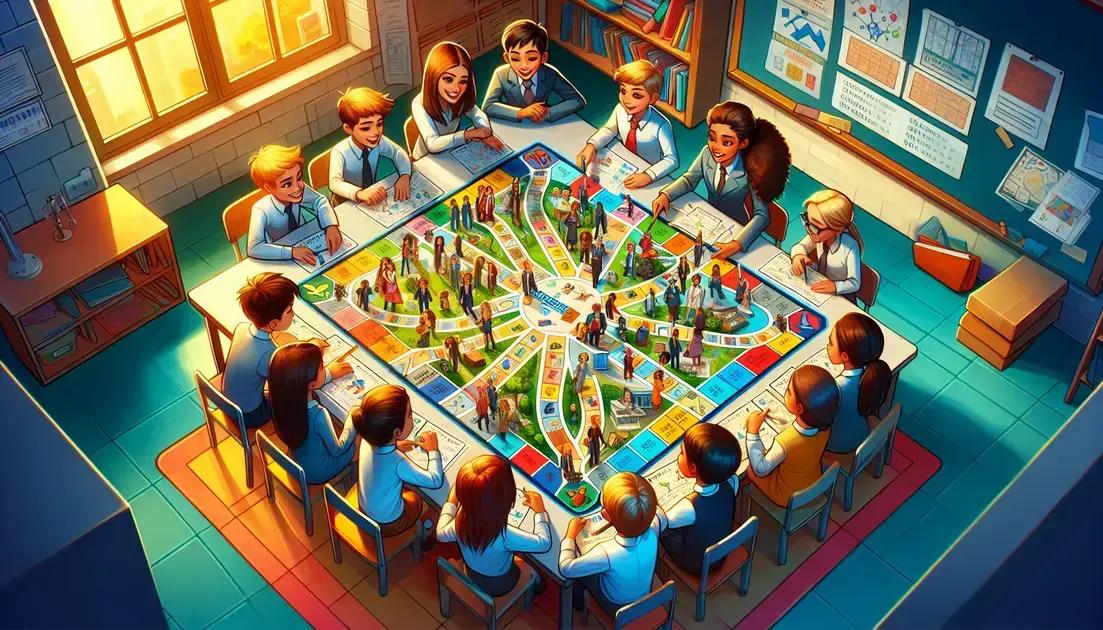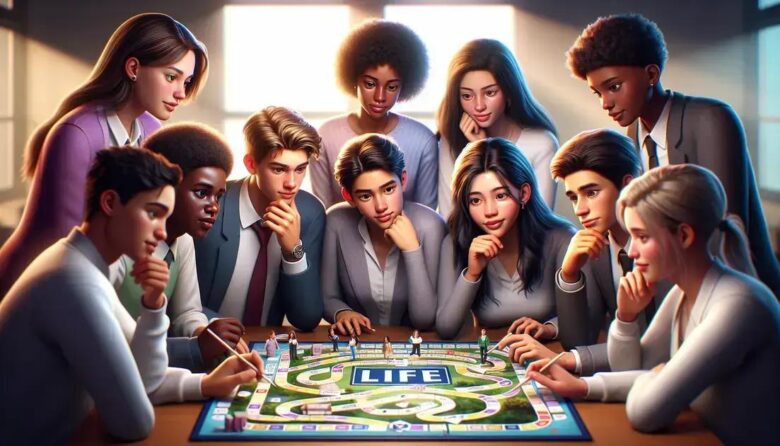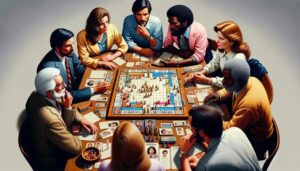Teaching careers with life board game uses interactive gameplay to simulate real career decision-making, helping students develop critical skills and explore career paths in an engaging, practical way.
Have you ever wondered how games can make career guidance less dull? The teaching careers with life board game approach transforms traditional lessons into lively, hands-on experiences. Curious how this playful method helps students explore their futures? Let’s dive in.
how the life board game simulates career decision-making
The life board game effectively simulates career decision-making by placing players in realistic scenarios where they must choose paths, jobs, and investments just like in real life. Each player starts with basic resources and must decide how to navigate opportunities, risks, and consequences that mirror those faced in career development.
Simulating Real Choices
Throughout the game, players encounter different events such as education decisions, job offers, and family matters. These situations require strategic thinking and reflect the unpredictability of real career paths. For example, choosing to go to college in the game may open higher-paying jobs but also means spending time and money, mimicking real-life trade-offs.
Understanding Risks and Rewards
The game introduces elements of chance through cards or spins, which simulate unpredictable factors like economic shifts or personal setbacks. This helps players learn how to balance risk and reward, preparing them mentally for similar circumstances they might face in their careers.
Developing Decision-Making Skills
By actively engaging in the game, players practice making choices with limited information and see the outcomes of those choices. This experiential learning promotes critical thinking, foresight, and adaptability, crucial skills for career success.
The life board game, therefore, acts as a practical tool to learn career decision-making in a low-risk, interactive environment, making the complex process more accessible and understandable.
benefits of using games for teaching career skills
Using games to teach career skills offers several key benefits that make learning more effective and enjoyable. Games provide an interactive platform where students can experience real-life scenarios and consequences, helping them develop critical thinking and decision-making in a safe environment.
Enhanced Engagement
Games naturally capture attention and motivate learners by incorporating fun and competition. This increased engagement helps students absorb career concepts more deeply compared to traditional lectures or reading materials.
Practical Skill Building
Through gameplay, students practice important career skills such as problem-solving, communication, and time management. Facing challenges in the game mimics workplace demands, allowing learners to develop confidence and adaptability.
Immediate Feedback
Games often provide instant feedback, showing players the results of their decisions. This helps learners understand cause and effect, encouraging reflection and improvement in their career planning strategies.
Encouraging Collaboration
Many career games are designed for group play, promoting teamwork and social skills. Collaborating on game goals helps students learn to negotiate, delegate roles, and value different perspectives.
Incorporating games into career education creates a dynamic, memorable learning experience that equips students with both knowledge and practical skills essential for future success.
designing career-related scenarios in the life game
Designing career-related scenarios in the life game requires thoughtful planning to ensure players face realistic and meaningful challenges. These scenarios should reflect common decisions and obstacles encountered in various career paths.
Incorporating Realistic Situations
Scenarios often include choices about education, job offers, promotions, and financial management. Including situations like internships, job interviews, or unexpected expenses adds depth and relatability, making the game more engaging and educational.
Balancing Complexity and Clarity
While scenarios should be realistic, they must also be simple enough for players to understand quickly. Clear instructions and defined outcomes help maintain the flow of the game and keep players focused on learning objectives.
Encouraging Critical Thinking
Good scenarios prompt players to weigh pros and cons, consider long-term effects, and adapt to changing circumstances. This promotes decision-making skills and helps players reflect on real-world career planning.
Creating a variety of career scenarios tailored to different interests and challenges ensures the game remains dynamic, inclusive, and informative for all participants.
engaging students through interactive learning experiences

Engaging students through interactive learning experiences boosts their motivation and retention of career knowledge. Using games like the life board game encourages active participation, making learning about career choices both fun and impactful.
Active Participation
Interactive activities require students to make decisions, discuss options, and reflect on outcomes. This hands-on approach moves learners beyond passive listening, helping them internalize career concepts and develop critical thinking skills.
Collaboration and Communication
Many interactive learning tasks involve group work, which fosters teamwork and communication skills. Students learn to express ideas, listen to others, and work together to solve problems, all essential for career success.
Real-World Connections
By simulating real-life situations, interactive experiences help students relate their learning to actual career paths. This connection enhances their understanding of workplace dynamics and the consequences of their decisions.
Incorporating elements like role play, discussions, and gamified challenges ensures students remain engaged and better prepared for their career journeys.
assessing student insights from the life board game
Assessing student insights from the life board game involves collecting and analyzing their experiences and decisions during gameplay. This helps educators understand how students perceive career choices and what skills they are developing.
Observation During Gameplay
Teachers can observe how students weigh options, handle setbacks, and collaborate with peers. Noticing patterns in decision-making reveals students’ priorities and problem-solving approaches.
Reflection and Discussion
After the game, guided discussions or reflection journals encourage students to articulate their learning. This process builds self-awareness and helps teachers evaluate comprehension of career concepts.
Using Assessment Tools
Surveys and quizzes related to the game scenarios can provide measurable data on student understanding. Combining qualitative and quantitative assessments offers a comprehensive view of student progress.
By assessing insights gained through the life board game, educators can tailor future lessons to address gaps and reinforce important career skills effectively.
case studies of teaching careers with the life game
Several case studies highlight how the life board game effectively teaches career concepts. Schools and organizations use the game to help students explore paths, understand consequences, and develop key skills.
Case Study 1: High School Career Classes
In one high school, teachers integrated the life game into career counseling classes. Students reported increased interest in exploring different careers and a better grasp of financial decisions involved in adult life. The interactive format made lessons memorable and practical.
Case Study 2: Youth Development Programs
Youth centers used the game to teach teamwork, goal setting, and risk management. The game fostered discussions about real-world challenges, enabling participants to develop essential life skills beyond just career knowledge.
Case Study 3: Adult Education Workshops
Adult learners benefited from the game by revisiting career choices and understanding long-term planning. Facilitators observed heightened engagement and reflection, helping participants make more informed decisions about their futures.
These examples demonstrate how versatile and effective the life board game is for teaching careers across ages and settings.
tips for teachers to maximize learning with the life board game
To maximize learning with the life board game, teachers should prepare clear objectives and create a supportive environment that encourages open discussion and reflection.
Set Clear Learning Goals
Defining what students should learn during the game ensures focus and direction. Goals can include understanding career pathways, financial literacy, or decision-making skills.
Facilitate Active Participation
Encourage all students to get involved by assigning roles or prompting quieter participants to share their thoughts. Active engagement boosts retention and understanding.
Guide Reflection and Discussion
After gameplay, lead discussions that help students connect game experiences to real life. Use questions that stimulate critical thinking and self-assessment to deepen learning.
Adapt Scenarios to Student Needs
Customize game scenarios to reflect local job markets or student interests. This personalization makes the learning more relevant and meaningful.
Provide Feedback and Assessment
Give constructive feedback based on player decisions and encourage peer evaluations. Assessment helps identify areas for growth and reinforces key lessons.
By applying these tips, teachers can turn the life board game into a powerful tool for career exploration and skill development.
Wrapping up the benefits of the life board game for career learning
The life board game offers an engaging way to explore career options and develop important skills like decision-making and financial planning.
By actively participating, reflecting on choices, and collaborating with others, students gain valuable insights that apply to real life.
Teachers who use the right strategies can make these game sessions more meaningful and impactful.
Overall, this interactive tool creates a fun and practical environment to prepare students for their future careers.




